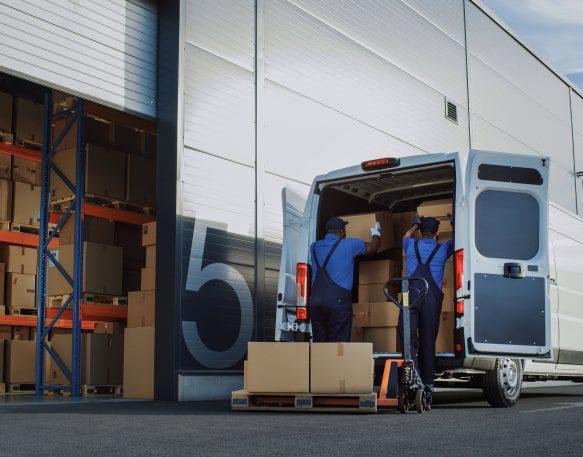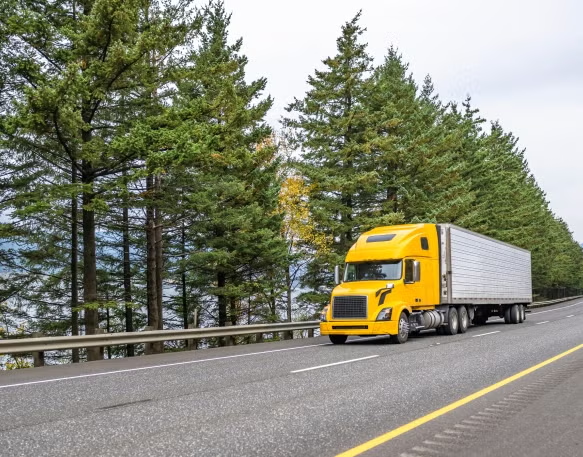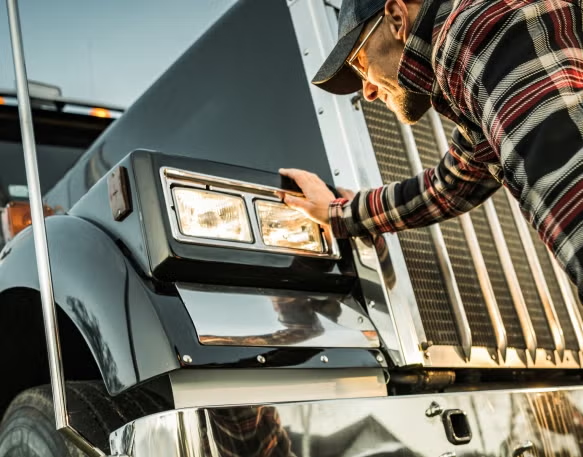The hardest part of starting any business is taking the first step. So many questions run through your mind as you consider all the possibilities that it can quickly become an overwhelming process even before you decide to act. Questions like “What should I sell? Who should I hire? What should our slogan be? What are the expenses?” are all likely to crop up. While being reflective about the process of starting a business can help flesh out ideas and answer curiosities, the journey to opening your business’ doors doesn’t have to be an intimidating one.
If you’re looking to start a cargo van business, you’ll need to forge a solid business outline to avoid delays and unexpected road bumps. Luckily, this guide can serve as a North Star to steer your business towards operational success and get your cargo vans up and running on the road.
What is a cargo van?
A cargo van is often mistaken for a box truck, but the two vehicles differ in capacity and convenience. Cargo vans resemble an ordinary passenger van with an elongated structure, void of back windows. The rear cargo space is accessible from the inside of the van and is not a detachable storage unit. You often see these vans used by e-commerce delivery drivers and vocational technicians, such as plumbers, electricians, air conditioning repairers, pool maintenance professionals, painters, and the like. Box trucks, on the other hand, have a separate cargo compartment solely accessible from the outside, with taller and straighter walls that can hold bulkier materials. This makes box trucks best suited for high-volume delivery and moving purposes.
Why start your business with a cargo van?
So what are some perks to choosing a cargo van as your business’s primary form of transportation? Well, if you’re new to owning a business, it’s a fantastic starter vehicle that offers excellent maneuverability because of its standard size and shape. Cargo vans can also squeeze onto side roads and parallel park more easily than larger transport vehicles. For your business’ specific needs, cargo vans range in capacity load, with limits anywhere between 500 lbs and 4,000 lbs and a maximum towing capacity of five tons.
As you can see, cargo vans are compact yet spacious and strong enough to carry significant loads as your business starts out. Then, as your company grows in clientele and demand, you can consider graduating to heftier vehicles for more oversized loads and interstate trips.
Your pre-launch cargo van business checklist
Before you go out and purchase your first cargo van, there are several components you’ll need to consider in advance of hitting the road including finances, insurance, certification, employment, brand identity, and organization.
Financial responsibilities and insurance coverage
Money will run the nascent stages of your business, so pouring what you can into a savings account will be your greatest financial resource. Create a detailed expense sheet to visualize how much you’ll need to spend on each item and tailor your budget accordingly.
Cargo vans will be the lifeblood of your company, which means they’ll be one of your largest expenses when you’re starting out. How large? Truecar estimates that brand-new ones will cost you between $30,000 and $45,000, depending on the make and model, cargo size, and load capacity. For more budget-friendly alternatives, you can try searching for used vans, leasing vans on a low monthly payment plan, or even securing a loan.
Also, keep in mind that your business will have unique expenses for day-to-day operations. These include tools and supplies, employee salaries, gas and van maintenance expenses, permits, and operational leases — all of which can vary per operation type.
Insurance not only protects you and your business from liabilities and damages — it’s required if you want to be on the road. You should devote a part of your budget to covering primarily liability insurance costs, which, on average, costs $245 per month or $3,300 per year for the $1 million coverage plan that shippers and brokers usually ask for. Of course, payment may be less or more expensive depending on the type of cargo you’re planning on transporting.
You’ll also need to invest in commercial van insurance to protect your business in the case of an accident where medical and property damages occur, as well as cargo insurance to cover what you’ll be transporting. Plans can range anywhere from $3,000 to $6,000, according to Trucking Insurance.
We know, it’s a lot. That’s why DAT recommends LoadSure to simplify your cargo insurance search, offering per-load rates that can minimize costs by 80 percent. One minute is all it takes to check cargo coverage off your to-do list, but always check your local and state regulations to ensure that your business is equipped with all necessary plans before you begin operations.
Certification requirements and employment protocols
Perhaps the most daunting aspect of starting a new business is the mountain of paperwork waiting for you. From federal and state permits to legal contracts and company registration, certified and verifiable documents are crucial to the validity of your cargo van business — and clear paperwork will save you trouble in the long run.
If you want to make things easier, we suggest trying DAT Authority, where our experts can take care of this for you. For carriers and owner-operators, DAT provides you with everything you’ll need: International Fuel Tax Agreement (IFTA) and International Registration Plan (IRP) permits, your own MC or US DOT number, and stress-free legal guidance to streamline the application process as much as possible.
Unlike box trucks and larger freight carriers, cargo vans don’t require a CDL license to drive, making it easier to recruit drivers. However, because moving large and expensive equipment involves a high degree of risk and responsibility, it’s still essential to establish a set of qualifications when hiring to ensure that you’ll attract candidates that best fit your cargo van business.
All employees in the freight field, including cargo van drivers, must comply with FMCSA Clearinghouse regulations that monitor drug and alcohol violations for commercial drivers. For rapid and reliable drug testing, DAT recommends CleanFleet, which has a 24-hour turnaround rate, rigorous testing standards, and workplace training programs to keep drivers in check.
Internal architecture and brand image
Now comes the more fun part: your cargo van business brand. Once you decide on the type of goods you’d like to transport, begin brainstorming an overall identity that will make your company memorable and iconic. Come up with a sleek and impactful logo, catchy slogan, and welcoming company culture that makes employees and customers feel proud to be a part of your business. If that doesn’t seem like it’s up your alley, find a marketing and design agency that can help you tap into the creativity you need. As your cargo van business gets ready to go live, you should also lay the foundations for a website and social media campaign to boost engagement and intrigue.
As the face of your business takes shape, start thinking about the organization of your internal structure. Ask yourself questions such as:
- How many drivers do I want to begin with?
- Will I be the sole driver at first until business grows?
- Do I want my business to be a limited liability corporation (LLC) or another type of corporation?
- Will my business have a hierarchical or horizontal employee structure?
- Who will be in charge of bookkeeping and accounting?
- How will I manage dispatching?
- Where do I want the office or headquarters of my business to be?
- What interfaces, systems, and programs will I use to document everything and track my drivers?
Write down what you envision your daily operations to look like, including the scope of your cargo van business in its budding months. The more detailed your business plan, the better positioned your company will be to avoid roadblocks commonly caused by insufficient preparation.
For more advice on mapping out a logistical framework for your company, you can also take a look at our Carrier Startup Guide, which provides valuable information about what you’ll need to consider as you build the bones of your cargo van operation.
Keeping your cargo van business running
Now it’s time to pull all the loose ends together and put your business plan to the test. Expect some adjustments as you get your footing in the industry, and take the time you need to get it right early on. To simplify matters and meet your budget, DAT is stocked with a variety of solutions and products trusted by thousands of users.
With the DAT load board, your business can take the guesswork out of scheduling routes and finding the best broker rates. Over 644,500 freight listings are posted daily, giving you loads of options depending on your preferences. DAT also offers Carrier TMS to grant transparency while on the road by generating real-time optimal transportation routes, providing constant driver location services, facilitating on-the-road transactions, and delivering around-the-clock customer support.
To grow your cargo van business over time, it’s important to build stellar relationships with the brokers and shippers you work with during trips so that you’re always in mind for future jobs and recommended to others in need of a carrier. As your company gains experience, upload content on social media and on your website to increase your online visibility and presence and better engage with your customers and partners within the field.
Staying on top of industry trends while remaining open to interaction fosters a sense of trust, community, and expertise that will attach itself to your brand and keep your business top of mind every time.
Go the distance with DAT Freight & Analytics
Starting a cargo van business can be intensive, but with DAT, it’s a breeze. Whether helping to solidify your business plan or optimizing your workstream, DAT is ready to help your company at any point in its journey. DAT’s forward-thinking and resourceful freight network solutions have helped kickstart and support businesses from ideation to operation — for carriers, owner-operators, brokers, and shippers.
Get started with us today to see how your business can thrive with DAT as your guide!
Find cargo van loads with the DAT load board!
Finding cargo van loads can be a time-consuming process, but the DAT load board makes it easy. With 644,500 listings posted daily and filtering capabilities, finding cargo van loads will be a breeze!
Start finding the right loads at the right time with the DAT load board today!




